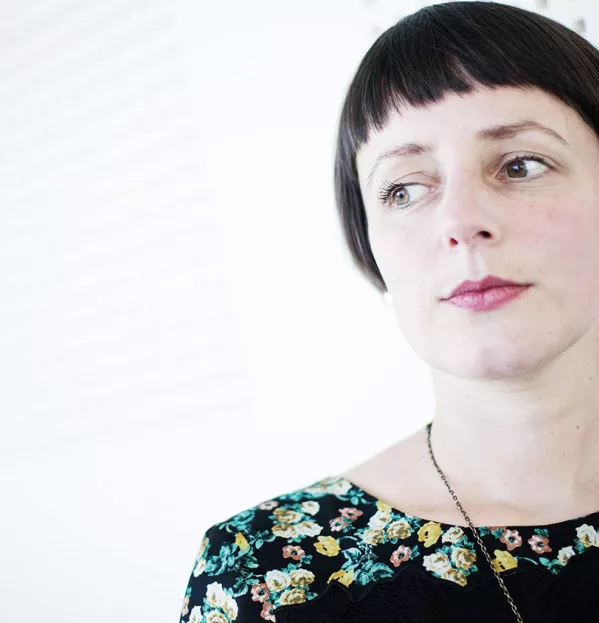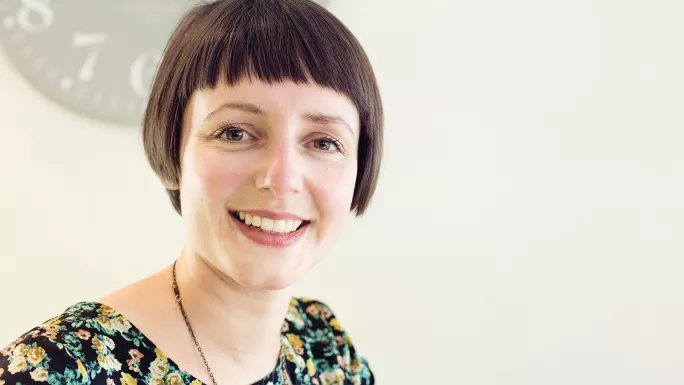Tes talks to... Victoria Simms

One of your pupils always struggles with their times tables. You have tried various methods to support them, but the information just doesn’t seem to stick. And now you are faced with a dilemma: is the problem that they are simply not practising or is something else going on?
Answering that question is very difficult, argues Dr Victoria Simms, a self-confessed maths geek and research director in the School of Psychology at Ulster University. Her research in developmental psychology has focused on the development of maths cognition, and what she has learned makes her sympathetic to the challenges faced by teachers whose job it is to spot and support pupils who struggle with maths.
Unlike some of her peers in academia, Simms does her research “with” teachers rather than “to” them.
“We work in collaboration with teachers and paediatricians and parents and children,” she emphasises.
A key part of her work has been a longitudinal study of children from preschool to the first year of primary, to examine the influence of attention and memory on maths skills and development. What it revealed confirmed findings from other research around the world - that working memory and visual-spatial skills are key to the development of mathematical ability.
Working memory, Simms explains, refers to the ability to hold information about a problem in your head while manipulating other information at the same time. Visual-spatial skills, meanwhile, refer to the ability to manipulate objects in mental space.

If a child has difficulty with either of these, they are far more likely to struggle with maths, she says.
“The importance of these different kinds of skills changes in terms of their strength over time,” she explains. “But we see consistently that these types of cognitive skills are important for mathematical development.
“Even if you’re following what psychologists describe as a typical developmental pathway, those thinking skills are really important for children in general.
“Working memory helps you learn your number words and your visual-spatial skills help you to count effectively. These thinking skills help us learn those very specific skills of basic numeracy. So it’s really important to think about how these things work together. Kids who are struggling with those general skills, then, may struggle with the more specific ones.”
Tetris can be a building block
Unfortunately, issues in these areas may not always be obvious. If we go back to the times tables example, it is very difficult to distinguish between a problem with these skills and a lack of engagement or practice. However, there are clues. Simms advises teachers to look out for the children who are losing their place in number problems or finding themselves confused by things that are quite straightforward for other people. Detailed knowledge of the child in question is key.
But identifying the issue is not the only challenge; solving it is problematic, too. The big question is how - and indeed whether - these cognitive skills can be improved.
Few interventions are currently available for improving visual-spatial skills, notes Simms, although research suggests that playing games such as Minecraft and Tetris can help. Likewise, some data suggests that children who regularly play with puzzles are more likely to have better visual-spatial skills. But there is little by way of definitive approaches.
Improving working memory is an even more contentious issue.
“It’s a controversial area of research,” says Simms. “When you look at these types of intervention available for working memory, you find that you can improve kids’ ability to do working-memory tasks - things like counting a list of numbers backwards - but they don’t get any better at mathematics. It’s very difficult to see transfer from training working memory to training mathematics.”
With the research offering few clues here, Simms and her team focus not on finding ways to try to improve working memory and visual-spatial awareness but rather exploring ways in which the demands on these areas can be decreased.
“We’re taking a different approach,” she explains. “For example, if we’re thinking about children who find it difficult to remember where they are in a problem, we would encourage teachers to think about ways they could help them to keep track of where they are. They can reduce the reliance on memory by letting them use their fingers, for example.”
And for children who have difficulty with visual-spatial skills, she continues, remedial strategies can be as simple as ensuring that they have lined paper to help with laying out information, or breaking numbers down into tens and units.
Overall, she advises a multi-layered approach to maths, giving children numerous ways of doing a task.
Problems can arise, she says, when pupils become fixated on doing tasks in a certain way - and she explains that’s as true for the young psychologists she teaches as for primary pupils. Simms gives the example of subtracting large numbers: she recently explained to an undergraduate student that it was sometimes easier to count up from the lower number to find the difference, but the student was taken by surprise, having only been taught to subtract.
“It’s about being adaptive,” she says. “We know that kids who are able to be flexible and use the right strategy in the right situation are better at mathematics.
“That freedom of having loads of tools under their belts and being able to apply the right strategies allows them to perform better and explore maths. We need to give kids loads of opportunities to use different strategies. It’s something that we need to keep coming back to again and again and again to say ‘You can do this flexibly’.”
She also advocates ensuring children are secure in their knowledge before moving on to the next concept - and returning to that core knowledge if children demonstrate they are not as secure as they could be. “Teachers should never be afraid to drop back a level and look at a piece of information that the children maybe haven’t been able to grasp,” Simms says. “It’s really, really important; we know from all of the research that there is no debate about this.
“Mathematics needs a strong foundation to build up to more complex concepts. If a child is struggling, it’s important to have the confidence to drop down a level and really secure the basic skills.”
Anxiety infects others
For teachers to nurture flexibility and teach in this way, they need to be confident in their own understanding and delivery of the subject.
“What we know from the research is that we can transmit anxiety about the subject to the children,” she explains. “There’s quite a lot of research that suggests that teachers who are anxious about maths don’t want to engage with numbers as much, and also find communicating about numbers difficult.”
Likewise, she continues, research has found a strong relationship between parental anxiety about maths and the amount of mathematical activity that goes on in the home. People who are less comfortable with maths are less likely to engage in number play with their children. This doesn’t necessarily mean that these children will be worse at maths but that their own anxieties around the subject could be higher as it is less familiar to them.
“Mathematics really is fundamental to a child’s development and communication in later life,” says Simms. “Basic numeracy skills assist kids in terms of achievement and just being a competent adult.”
A broader acknowledgement of this would lead to more parity with literacy - and more research would be completed on maths cognition, as the funding would be easier to come by. Certainly, Simms believes this is an area that needs much more research, and that teachers should to be at the heart of it.
“[Teachers] tell us what we need to research because there’s no point in us researching things that don’t help kids do better,” she says. “We want to support teachers to know what they are doing has a really strong evidence base.
“They are looking for that reassurance and it’s something that we really value.”
Zofia Niemtus is a freelance writer
You need a Tes subscription to read this article
Subscribe now to read this article and get other subscriber-only content:
- Unlimited access to all Tes magazine content
- Exclusive subscriber-only stories
- Award-winning email newsletters
Already a subscriber? Log in
You need a subscription to read this article
Subscribe now to read this article and get other subscriber-only content, including:
- Unlimited access to all Tes magazine content
- Exclusive subscriber-only stories
- Award-winning email newsletters